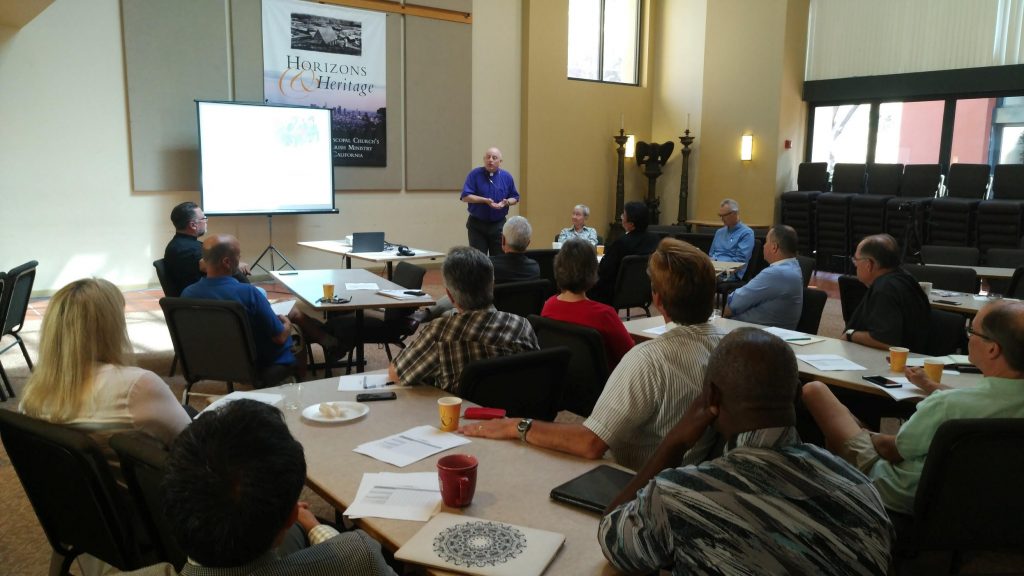On May 9, 2018, 30 members of churches and organizations from around the Diocese of Los Angeles gathered at the Cathedral Center in Echo Park for the first workshop in a new series hosted by Episcopal Enterprises. Launched in 2017 in the Diocese of Los Angeles, Episcopal Enterprises looks beyond traditional stewardship models by “providing an innovative platform for the church to engage in social enterprise in order to create greater capacity for ministry and better sustain our communities and our parishes.”
For the Rev. Canon Jaime Edwards-Acton, founder of Episcopal Enterprises and rector of St. Stephen’s Episcopal Church in Hollywood, church funding is a justice issue.
After becoming rector of St. Stephen’s, where he has served for almost two decades, it became clear that the traditional model of funding through pledge and plate contributions would not be sufficient to sustain the ministries the church hoped to offer. Although parishioners at St. Stephen’s pledge an average of 10% and are also generous with their time and talents, the church is small and poor. Even with parishioners contributing the traditional 10% tithe, the church brings in only $55,000 in pledge income, not nearly enough to employ clergy, maintain property, and fund programs, and nowhere near what a similar rate of pledging would bring in at a different parish in another part of the city.
By exploring what resources and skills they could leverage to fund their ministries, St. Stephen’s was able to establish a number of social enterprise programs to raise income. While large, under-utilized buildings can be a detriment for many churches, land and buildings became a benefit for St. Stephen’s, whose property is located between downtown Hollywood and the Hollywood Hills. The parish is currently home to a variety of programs, including Delaney Wright Fine Arts Preschool, the Hope Garden, and the Jubilee Consortium. Jubilee Consortium, in turn, operates the Episcopal Urban Intern Program, group fitness classes at churches around Los Angeles, and a youth jump rope program. By hosting different programs at the church, St. Stephen’s has been able to stretch their pledge income of $55,000 into an annual budget of approximately $1 million and employs 20 people in mostly fulltime positions. For Edwards-Acton, this work is important because it “can help small, urban, poorer churches to hire the best clergy and staff and impact their neighborhoods at a level commensurate with their dreams, not simply their income levels.”
Yet the benefits of these social enterprises go beyond the walls of the church. Social enterprise programs and businesses not only help parishes increase revenue but also offer services to and build relationships with the broader community. At St. Stephen’s, this means helping the community access early childhood education, fresh food, and fitness classes.
After Bishop John Taylor highlighted the work of St. Stephen’s in an address at last year’s diocesan convention, Edwards-Acton approached him about starting a diocesan-wide conversation about social enterprise. With Bishop Taylor’s support and in consultation with Betsy Densmore, a vestry member of St. John’s, Costa Mesa and founder and managing director of the Academies for Social Entrepreneurship, Episcopal Enterprises was born.
As he looks toward the future of the new ministry, Edwards-Acton hopes they will be able to equip “small, urban, poorer churches to live out their dreams of changing their communities and living out the love of Jesus in the world” as much as larger churches with more resources are able to do. In an effort to reach these small, poor churches, each of Episcopal Enterprises’ training sessions will be made available at no cost on their website following the in-person training. The first workshop, “Assessing Your [Social Enterprise] Options – Identifying Assets, Opportunities & Resistance Factors,” is currently available to stream.

